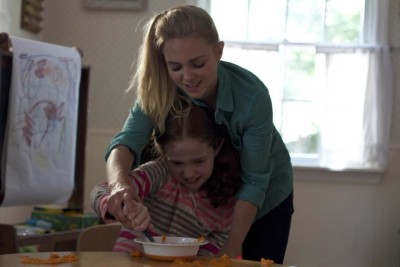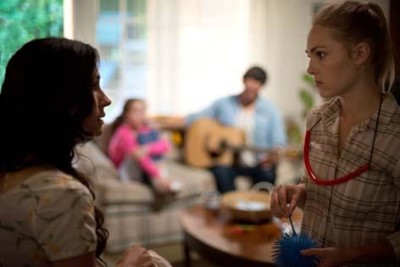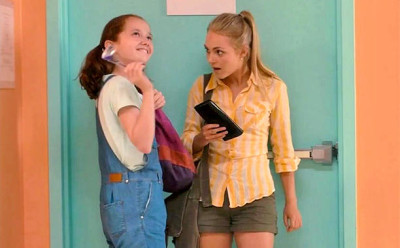Despite what is being touted of late, let it never be said that there isn’t diversity in filmmaking. And contrary to the “forced” diversity which many film festival directors, programmers and controlling guilds and academies are of late trying to force feed to the industry and public alike, the diversity I am seeing in many films is genuine, and reflects not only a diversity of issues and topics and performers in front of the camera, but directorial craftsmanship and artistry that rings true of the voice behind the camera. One such film is JACK OF THE RED HEARTS.

A glistening diamond that shines as bright as the sun, thanks to director Janet Grillo’s intimate knowledge of being the mother of a child on the Autism Spectrum, and screenwriter Jennifer Deaton’s similar experiences as the aunt of an autistic child, JACK OF THE RED HEARTS is buoyed by authenticity and the film’s immersiveness in the day-to-day lives of not only autistic 11-year old Glory, but her entire family, and that of an 18-year old grifter who cons her way into a job as Glory’s “companion.” Prismatic by design, Grillo and Deaton balance the effects of autism on a family and a mother’s often “smothering” love with that of Jack – masking her true identity under the guise of trained caregiver Donna – who has spent her life in and out of foster homes and jails following the death of her mother.
We first meet Jack/Donna helping her younger sister still in the foster care system, escape from her latest home. Always abiding by their mother’s final wishes that they stay together and take care of each other, by hook or by crook, that is what Jack has tried to do. But now, she’s violated her latest probation and the authorities are looking for her, resulting in sister Coke (their sibling nickname is “Jack and Coke”) being taken to juvenile hall until a new foster home can be found. Jack’s only possible solution? Get a job, make some money and find an apartment.

And then there’s Glory. On the Autistic Spectrum, she is tantrum prone, non-verbal and almost smothered by her mother Kay to the point of Kay excluding the rest of the family – dad Mark, brother Robert and Dudley. Money is tight thanks to Mark being the only wage-earner and medical care and therapy being so costly which means Kay needs to go back to work and a live-in “companion” must be found to care for Glory. Adding to the mix, Kay is determined for Glory to enter a special school, however, with Glory’s limited abilities, it will only be through intensive one-on-one work that Glory even has a shot.
Seeing Mark post a help wanted flyer at the local market, Jack/Donna puts her own plan into action, assuming the identity of the real companion/caregiver Kay hired. Her grifting street skills prove to be an asset in securing the job and assuming this “new identity.” But what Jack/Donna overlooked was learning anything about autism and the instruction and care Glory required.

While the audience is expecting to see a train wreck occur, Jack/Donna proves to be anything but. Despite a mandatory learning curve, it is evident that the life experiences of being on the street or in family services has given Jack/Donna a gift overlooked by all when it comes to Glory. Everyone is different, everyone has different needs, everyone has different skills and the same method for one is not necessarily the same for another. As Jack/Donna employs her own “Annie Sullivan tough love” and sometimes chaotic and irreverent methods in caring for Glory, not only is she growing as a person, but Glory’s special gifts and intelligence begin to take shape and the entire family starts to find each other again.
Naturally trouble rears its ugly head when Jack/Donna and Robert take a liking to each other and Robert gets a bit too inquisitive and starts peeking into drawers. Could this be the end for Jack’s dreams, Kay’s dreams for Glory and Glory’s own future?

As Jack/Donna, AnnaSophia Robb is standout, displaying a real maturity as an actress as she navigates the troubled waters of Jack’s life, while finding emotional footing on which to grow and move forward; something that really takes hold in the second half of the film. Without a doubt her most emotionally textured role to date, Robb brings a truth and authenticity to Jack that allows the audience to forgive Jack’s transgressions given the redemptive nature of her own catharsis.
Taylor Richardson, best known for her work on Broadway in Annie!”, knocks it out of the park and then some as Glory. The physicality and nuance is mesmerizing, as are the physical struggles of tantrums and yes – even climbing out on a roof. Thanks to the script structure with Jack’s revelations for handing Glory, Richardson takes us straight to Patty Duke’s Oscar-winning turn as Helen Keller. She is a powerhouse on all fronts.

Unfortunately, although undoubtedly rooted in truth, Famke Janssen’s overdone smothering and freneticism wears thin. Joyful is when we get a respite from the frenzy and focus shifts from Kay and Glory, to Jack/Donna and Glory and the involvement of the rest of the family. If it was the intent of Grillo and Jansen to make the audience as weary as a mother of an autistic child requiring great care, they have done so. But that also diminishes the film, lending more to a melodramatic Lifetime television movie.
As comes as no surprise, Scott Cohen proves a solid anchor as father/husband Mark while newcomer Israel Broussard displays some potential as Robert.
Notable is that Grillo and Deaton don’t bog the film or the audience down with all the genetic and medical aspects of autism. We are given enough information to shine a light on what care and attention needs to be given, with “talking points” keenly built in to the dialogue. Where they excel is with showing us the overall impact and toll raising an autistic child has on the family unit.
While there are the expected “Hallmark” touchstone moments, Grillo and Deaton keep them to a minimum. I must admit, however, that I am still struggling with the film’s end, which I will not divulge here. Here is where ambiguity and a lack of truth is felt. Where they never falter, however, is with an inherent sensitivity on every level of the film – from script, to performance, to lensing, and particularly with Taylor Richardson’s performance.

Characters, especially Glory and Jack/Donna, are full-bodied, with many different sides, and thanks to some extremely well constructed metaphor, each is approached from different angles both on the page, in lensing and in performance.
Grillo smartly varies the POV using effective visual grammar thanks to cinematographer Hillary Spera (who did some impressive lensing on Katie Aselton’s first directorial, “Black Rock”). Defining is Glory’s POV which while visually clouded, is captured with a dichotomous beauty thanks to sun flares and Glory’s “reaching for the stars” which, by extension through Pollyanna-like rainbow prisms, opens up Glory’s world and the film, lending to the idea of possibilities and hope. Wider angle framing with Glory also adds to the character, particularly as Jack/Donna breaks through to Glory and framing tightens as deeper familial connections are made. Similarly, natural lighting and tight framing on scenes between Jack/Donna and Coke mirror their relationship dynamic.
Keeping the visual tone light, production designer Jimena Azula soars with the use of color that is softer pastels and pale walls, yet stimulating with pops of vibrant reds peppered throughout in association with Glory.
Unfettered truth that shines with authenticity and sensitivity, JACK OF THE RED HEARTS is glorious.
Directed by Janet Grillo
Written by Jennifer Deaton
Cast: AnnaSophia Robb, Taylor Richardson, Famke Janssen, Scott Cohen, Israel Broussard












